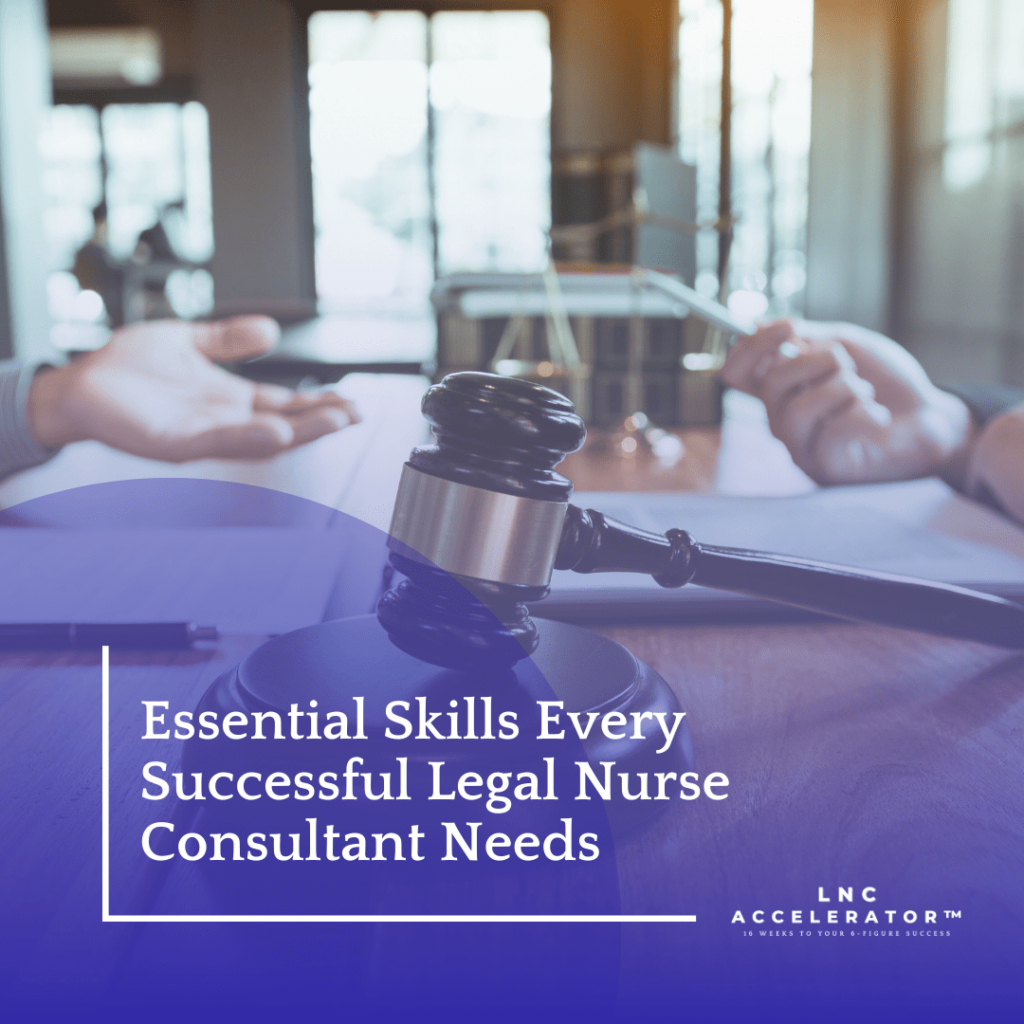
Essential Skills Every Successful Legal Nurse Consultant Needs
Transitioning from bedside nursing to legal nurse consulting is an exciting career move that allows you to leverage your medical expertise in a new and dynamic field. However, success in this role requires more than just your nursing knowledge. In this blog post, we’ll explore the essential skills every successful legal nurse consultant (LNC) needs, drawing insights from industry leaders like Stephaney Edwards, CEO of the LNC Accelerator™.
Strong Clinical Knowledge and Experience
Your nursing experience is the foundation of your LNC career. Attorneys hire LNCs for their medical expertise, so a solid understanding of various medical conditions, treatments, and procedures is crucial.
Key aspects:
- Broad clinical knowledge across multiple specialties
- Understanding of medical terminology and abbreviations
- Familiarity with hospital protocols and standards of care
- Ability to interpret lab results, medication records, and diagnostic tests
Remember, your nursing license and experience are your primary qualifications. As Stephaney Edwards emphasizes, additional certifications are not necessary to become a successful LNC.
Critical Thinking and Analytical Skills
As an LNC, you’ll need to analyze complex medical records, identify relevant information, and draw logical conclusions.
How to develop:
- Practice reviewing medical records critically
- Learn to spot inconsistencies and deviations from standard care
- Develop a systematic approach to case analysis
- Engage in continuing education to stay current with medical advancements
Excellent Communication Skills
LNCs must be able to translate complex medical information into language that attorneys and jurors can understand.
Areas to focus on:
- Clear and concise writing for reports and summaries
- Verbal communication for consultations and potential testimony
- Active listening during client meetings and depositions
- Ability to explain medical concepts to non-medical professionals
The 3 Easy Steps to a Powerful Conversation with Attorney Prospects
Legal and Regulatory Knowledge
While you don’t need to be a legal expert, understanding basic legal concepts and terminology is essential for effective communication with attorneys.
Key areas to study:
- Common legal terms used in medical-related cases
- Understanding of the litigation process
- Familiarity with types of cases LNCs commonly work on (e.g., medical malpractice, personal injury)
- Knowledge of healthcare regulations and standards (e.g., HIPAA)
Research Skills
LNCs often need to conduct medical literature searches to support case arguments or understand current standards of care.
How to improve:
- Familiarize yourself with medical databases and search engines
- Learn to critically evaluate research studies
- Stay updated on current medical practices and guidelines
- Develop skills in organizing and summarizing research findings
Attention to Detail
Overlooking a crucial piece of information in a medical record could have significant consequences for a case.
Tips for improvement:
- Develop a systematic approach to reviewing records
- Use checklists to ensure thoroughness
- Take breaks to maintain focus during long review sessions
- Double-check your work for accuracy
Time Management and Organization
As an LNC, you’ll often be juggling multiple cases with tight deadlines.
Strategies to consider:
- Use project management tools to track cases and deadlines
- Develop a system for organizing physical and digital files
- Learn to prioritize tasks effectively
- Set realistic timelines for case reviews and report writing
Business Acumen
Many LNCs work as independent consultants, requiring basic business skills to succeed.
Key business skills:
- Marketing and client acquisition
- Financial management and pricing strategies
- Contract negotiation
- Time tracking and billing
The LNC Accelerator™ program offers comprehensive business training tailored for legal nurse consultants, helping you develop these crucial skills.
Ethical Decision-Making
Maintaining high ethical standards is crucial in the legal nurse consulting field.
Important aspects:
- Understand and adhere to nursing and LNC ethical guidelines
- Maintain client confidentiality
- Provide objective analysis, regardless of which side hired you
- Know when to recuse yourself due to conflicts of interest
The Ethics of Legal Nurse Consulting: Navigating Potential Conflicts
Networking and Relationship Building
Building a strong professional network is essential for growing your LNC business.
Networking strategies:
- Attend legal and medical conferences
- Join professional associations for LNCs and legal professionals
- Utilize social media platforms like LinkedIn
- Develop and maintain relationships with attorneys and other LNCs
Adaptability and Flexibility
The medical and legal fields are constantly evolving, and successful LNCs must be able to adapt to new technologies, regulations, and case types.
How to stay adaptable:
- Embrace lifelong learning
- Be open to new ways of working (e.g., virtual consultations)
- Stay informed about changes in healthcare and law
- Be willing to take on diverse case types to broaden your experience
Stress Management
Working on legal cases, especially those involving severe injuries or deaths, can be emotionally challenging.
Stress management techniques:
- Develop a self-care routine
- Set boundaries between work and personal life
- Practice mindfulness or meditation
- Seek support from peers or professional counselors when needed
Technology Proficiency
Familiarity with various software and digital tools is increasingly important in the LNC field.
Key areas:
- Electronic medical record systems
- Case management software
- Video conferencing tools for virtual consultations
- Microsoft Office or similar productivity suites
Cultural Competence
As an LNC, you may work on cases involving patients from diverse cultural backgrounds.
How to develop:
- Learn about different cultural perspectives on health and healthcare
- Be aware of potential biases in medical treatment and documentation
- Understand how cultural factors might influence a case
- Develop sensitivity in communicating about cultural issues
Presentation Skills
You may need to present your findings to attorneys, in depositions, or even in court.
Ways to improve:
- Practice explaining complex medical concepts simply
- Learn to create clear, informative visual aids
- Develop confidence in public speaking (consider joining groups like Toastmasters)
- Prepare thoroughly for potential questions or challenges to your analysis
Continuous Professional Development
The most successful LNCs are committed to ongoing learning and skill enhancement.
Strategies for continued growth:
- Attend relevant webinars and conferences
- Read medical and legal journals regularly
- Seek feedback from clients and peers
- Consider specializing in high-demand areas of legal nurse consulting
From Novice to Expert: Growth Strategies for New Legal Nurse Consultants
Problem-Solving Skills
LNCs often encounter complex cases that require creative problem-solving to unravel.
How to enhance:
- Practice breaking down complex issues into manageable parts
- Develop a methodical approach to analyzing problems
- Be open to considering multiple perspectives
- Learn from how other LNCs have approached similar cases
Emotional Intelligence
Understanding and managing your own emotions, as well as those of others, is crucial in the often high-stakes world of legal cases.
Key aspects:
- Self-awareness of your own biases and emotional reactions
- Empathy for clients, patients, and other professionals involved in cases
- Ability to remain objective despite emotional content in cases
- Skill in navigating potentially tense situations with clients or opposing counsel
Conclusion
Becoming a successful legal nurse consultant requires a diverse skill set that goes beyond your nursing expertise. By focusing on developing these essential skills—from critical thinking and communication to business acumen and emotional intelligence—you can position yourself for success in this rewarding field.
Remember, as Stephaney Edwards of the LNC Accelerator™ emphasizes, your nursing experience is your most valuable asset. These additional skills complement your medical knowledge, allowing you to effectively translate your expertise into valuable insights for legal professionals.
Programs like the LNC Accelerator™ can provide structured support in developing many of these skills, offering targeted training, mentorship, and resources specifically designed for nurses transitioning into legal consulting.
By continuously honing these skills and leveraging your unique nursing background, you can build a thriving career as a legal nurse consultant. Whether you’re just starting out or looking to enhance your existing LNC practice, focusing on these essential skills will set you apart in the field and drive your success.
FREE DOWNLOAD
10 LNC Business Essentials
Become a Legal Nurse Consultant
6 Figure Income Projection + Cases & Clients in 16 Weeks or Less...
(Or We’ll Work With You 1-On-1 For Free Until You Do)


